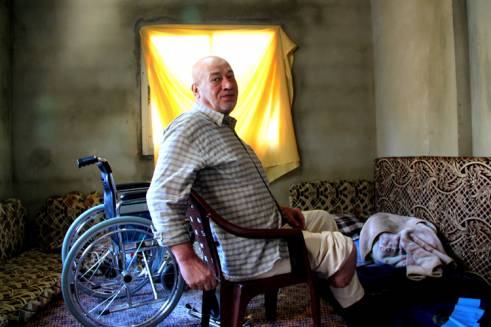By Attila Kulcsar
It’s been three years since the war began in Syria. Currently, around 72,000 Syrian refugees are aged over 60. In conflict situations, older people are among the most vulnerable, with specific needs that must be taken into account.
On the third anniversary of the conflict, we’re highlighting the plight of the civil war’s silent casualties: The invisible victims who have succumbed both in Syria and in host countries to what were previously manageable chronic illnesses, such as high blood pressure and diabetes.
The lack of physical and financial access to regular healthcare and medication has placed even more stress on people living with chronic diseases. The impact is accentuated by the fact that, before the conflict, people in Syria with non-communicable diseases were accustomed to regular treatment.
A forthcoming survey, produced jointly with Handicap International, indicates that 54% of older Syrian refugees living in Jordan and Lebanon have a chronic disease – with war bringing damaging interruptions to their treatment.
Suffering in exile
The physical, psychological and economic consequences of the conflict in Syria, and in neighbouring countries which have taken in Syrian refugees, are worsening by the day.
Ahmed, 67, suffers from diabetes and cardiovascular disease. Complications of his diabetes led to the amputation of his lower right leg in 2006. Ahmed and his family have been in Lebanon since January.
Ahmed is concerned about obtaining his medicines and says: “I need my medication. That is what is most important to me.”
Ahmed’s wife, Ilham, explains: “We bought a stack of his medicines in Syria and brought them with us. In the next ten days he won’t have all the medication he needs anymore.
“We are trying to get insulin, but it is difficult to find. The doctor wants to see Ahmed before prescribing anything, but it is impossible to get him to the hospital.”
What we’re doing
We’re helping 1,900 of the most vulnerable older refugees in Jordan and Lebanon with cash transfers – which give older people and their families the means to acquire essentials like medicine and food, with a degree of independence and dignity.
We’re also working with other NGOs and organisations in Jordan and Lebanon, to make sure that aid is as age-friendly as possible. It’s not unusual for the unique needs of older people to be over-looked in an emergency.
We’re therefore providing training to agencies like the UNHCR and working to improve services in Za’atari camp in Jordan. We’re also making sure that the new camp in Jordan, Azraq, is fit for older people.
Protracted conflict
Toby Porter, HelpAge CEO, said:
“On the third anniversary of the conflict we can see the current Syrian crisis is getting increasingly protracted and will bring additional challenges for both refugees and the host country.
“The loss of previously existing coping mechanisms and support networks also has a big impact on older people. When fleeing the fighting, older people often leave behind a supportive physical and social environment. Life in exile means they often no longer have accessible homes and workplaces, secured access to treatment or connection with family members and relatives.”
